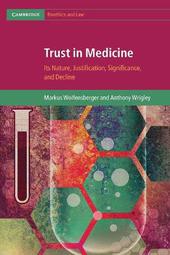
|
Trust in Medicine: Its Nature, Justification, Significance, and Decline
Paperback / softback
Main Details
| Title |
Trust in Medicine: Its Nature, Justification, Significance, and Decline
|
| Authors and Contributors |
By (author) Markus Wolfensberger
|
|
By (author) Anthony Wrigley
|
| Series | Cambridge Bioethics and Law |
|---|
| Physical Properties |
| Format:Paperback / softback | | Pages:270 | | Dimensions(mm): Height 227,Width 152 |
|
| Category/Genre | Ethics and moral philosophy
Bio-ethics |
|---|
| ISBN/Barcode |
9781108732734
|
| Classifications | Dewey:174.2 |
|---|
| Audience | | Professional & Vocational | |
|---|
| Illustrations |
Worked examples or Exercises; 2 Tables, black and white; 1 Halftones, black and white; 4 Line drawings, black and white
|
|
Publishing Details |
| Publisher |
Cambridge University Press
|
| Imprint |
Cambridge University Press
|
| Publication Date |
1 July 2021 |
| Publication Country |
United Kingdom
|
Description
Over the past decades, public trust in medical professionals has steadily declined. This decline of trust and its replacement by ever tighter regulations is increasingly frustrating physicians. However, most discussions of trust are either abstract philosophical discussions or social science investigations not easily accessible to clinicians. The authors, one a surgeon-turned-philosopher, the other an analytical philosopher working in medical ethics, joined their expertise to write a book which straddles the gap between the practical and theoretical. Using an approach grounded in the methods of conceptual analysis found in analytical philosophy which also draws from approaches to medical diagnosis, the authors have conceived an internally coherent and comprehensive definition of trust to help elucidate the concept and explain its decline in the medical context. This book should appeal to all interested in the ongoing debate about the decline of trust - be it as medical professionals, medical ethicists, medical lawyers, or philosophers.
Author Biography
Markus Wolfensberger is Emeritus Professor of Otorhinolaryngology at the Universitat Basel, Switzerland. Until his retirement in 2010, he was Head of the Department of Otorhinolaryngology, Head and Neck Surgery as well as Director of the Head Neck Tumour Centre at the University Hospital of Basle. He also holds a doctorate in medical ethics and was, for many years, chair of the Clinical Ethics Advisory Board at the University Hospital of Basle. His particular interest, both as a surgeon and as a researcher, was in cancer of the head and neck. As a clinical ethicist one of his major interests was in preventing unnecessary and over-aggressive treatment. Anthony Wrigley is Professor of Ethics at the Centre for Professional Ethics (PEAK), School of Law, Keele University. He is a philosopher with a special interest in issues in biomedical ethics. His particular area of interest is the analysis of key concepts in bioethics, including vulnerability, hope, harm, personhood, mental illness, consent for others, moral authority, and the nature of moral expertise. His work includes contribution to the European Textbook on Ethics in Research (with Jonathan Hughes et al., 2010), Ethics, Law and Society: Volume V: Ethics of Care, Theorising the Ethical, and Body Politics (edited with Nicky Priaulx, 2013), and Loss, Dying and Bereavement in the Criminal Justice System (edited with Sue Read and Sotirios Santatzoglou, 2018).
Reviews'Is a lack of trust in your doctor bad for your health? This book examines this question and the nature of trust. While doctors haven't become more fallible, trust in them is said to be declining. Is this decline real or imaginary, and what is responsible? How can trust be restored? The authors leave no stone unturned in answering these questions and exploring the interplay between expectation, risk and competence.' Daniel Simmen, Klinik Hirslanden, Zurich 'This book, Trust in Medicine: Its Nature, Justification, Significance, and Decline, is now the starting point for all future work on trust in medicine. It is a significant and original contribution to the analysis and understanding of the concept of trust and its proper role in patient care. The collaboration between the authors, a physician and a philosopher, mean that the discussion is both theoretically rich but always tied to the realities of modern health care. This is exemplary bioethics, advancing the field and stimulating new avenues for future scholarship.' Angus Dawson, The University of Sydney 'I thoroughly enjoyed reading Trust in Medicine: Its Nature, Justification, Significance, and Decline by Wolfensberger and Wrigley. It is a very clear example of how to do philosophical bioethics that engages closely with the empirical context and with practical clinical issues. The book thoroughly considers the philosophical literature on Trust and then, in a careful and strategic manner applies the lessons of that literature to the clinical context and the doctor- patient relationship. It is an extended piece of bioethics that will engage and challenge philosophers, bioethicists and clinicians. When we imagine applied philosophical bioethics, this is the kind of work that should come to mind.' Mark Sheehan, University of Oxford
|